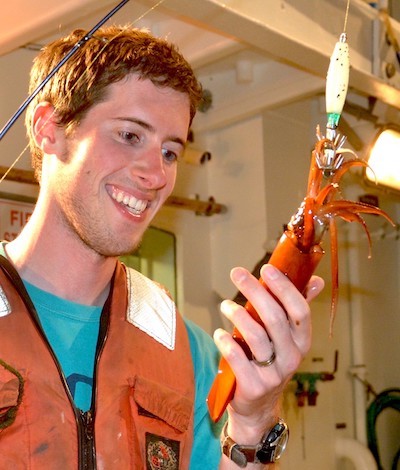Biology professors examine differing impact of warming oceans on aquatic life
Not all marine animals react to changing ocean conditions in the same way, according to Dr. Matthew Birk, a biology professor at Saint Francis University and Brad Seibel, a biological oceanographer at the University of South Florida. Seibel and Birk co-authored a recent publication on the topic.
The study is the first to drill down into the relationship between oxygen, temperature, and the metabolic requirements of vertical migrators, which include billions of marine animals from tiny crustaceans called krill to the six-foot-long jumbo squid. Seibel and Birk used modeling to understand how six species of krill and the jumbo squid would respond metabolically to the varying parameters approximating day and night habitats. Contrary to our expectations, they found that climate change is not driving vertically-migrating tropical animals away from the equator as we thought, but rather the warming water at mid-latitudes is opening up a door for new habitat at higher latitudes. “Vertical migrators buck the basic narrative, which is based largely on studies of coastal animals,” said Seibel. The combination of temperature and oxygen environments encountered by vertical migrators is completely different from their more well-studied coastal counterparts. “This study is a good example of the fact that the conclusions we often draw from well-studied -- and easy-to-catch -- organisms may not hold true for the greater diversity of species and lifestyles found in the oceans,” said Birk.

"Unique thermal sensitivity imposes a cold-water energetic barrier for vertical migrators" was published on Oct. 10 in Nature Climate Change.
Abstract: Alterations of marine species’ ranges with climate change are often attributed to oxygen limitation in warming oceans. Here we report unique metabolic temperature sensitivities for the myriad of vertically migrating oceanic species that daily cross depth-related gradients in temperature and oxygen. In these taxa, selection favours high metabolic activity for predator–prey interactions in warm shallow water and hypoxia tolerance in the cold at depth. These diverging selective pressures result in thermal insensitivity of oxygen supply capacity and enhanced thermal sensitivity of active metabolic rate. Aerobic scope is diminished in the cold, well beyond thermodynamic influences and regardless of ambient oxygen levels, explaining the native distributions of tropical migrators and their recent range expansions following warming events. Cold waters currently constitute an energetic barrier to latitudinal range expansion in vertical migrators. As warming due to climate change approaches, and eventually surpasses, temperatures seen during past warming events, this energetic barrier will be relieved.
Nature Climate Change is a monthly journal dedicated to publishing the most significant and cutting-edge research on the nature, underlying causes or impacts of global climate change and its implications for the economy, policy and the world at large. All editorial decisions are made by a team of full-time professional editors.
News of the findings has been reported on several online sources including: